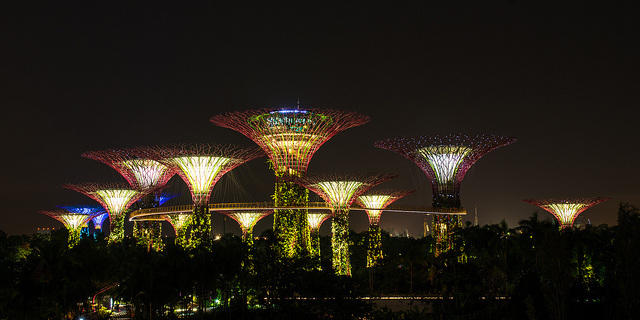
Singapore, this year’s ASEAN chair, faces some tough tasks. It must lift confidence in the organisation and inject the inspiration it needs to overcome a ‘midlife crisis’ while encouraging favourable conditions for continued economic growth. And it must do this in a time of geopolitical turbulence while trying to balance relations with the great powers.
If anyone in the region can handle such pressure, it’s Singapore.
One of the smallest countries in the world, Singapore is also one of the best governed. In the region, it has a reputation as a sophisticated diplomat, able to advise and explain the area’s complexities to more powerful nations. While not impervious to pressure, Singapore has earned the right to be treated as an equal in the international arena despite its size. The
debate on how small states should behave has been defining Singaporean strategic choices and reflecting its national identity in recent months. Singapore’s success has been based precisely on the fact that it has always ‘thought big’ and that’s how it has gained respect and recognition in the international arena.
The rise of China has had a bigger effect on Southeast Asia than any other factor during the time that Singapore has been playing the challenging role as the China–ASEAN coordinator since 2015. While
its relationship with China is not without hurdles, Singapore’s neutrality and strong insistence on the rules-based-order remain important pillars for sustaining the norms and rules of regional engagement. Singapore is also considered America’s most reliable ASEAN partner (particularly given the recent deterioration in ties with US treaty allies Thailand and the Philippines). Singaporean diplomacy remains one of the region’s most effective.
And it’s not only contacts with external partners that are performing well, but intra-ASEAN diplomacy too. Within the association, Singapore’s position has been consistently significant. In recent years, a new generation of democratically elected leaders has taken power in Indonesia and the Philippines, while Thailand and Myanmar have experienced more complex and volatile transitions between civil and military rule.
The most drastic change within ASEAN has been most apparent in the region’s largest democracies, Indonesia and the Philippines, whose regional influence, including within ASEAN, has dropped significantly compared with their roles and engagement under past leaders. Both Joko Widodo and Rodrigo Duterte were mayors before becoming presidents, and both tend to still think more locally.
Singapore is the only original ASEAN member state (Vietnam joined ASEAN in 1995) that has had leadership continuity since the association was created. With that succession of power within the People’s Action Party, its leaders’ strategic outlook, including on the role of ASEAN, have remained comparatively consistent. Notwithstanding internal anxieties about the
fourth generation of leadership, Singaporean politics remain relatively more stable than those of its fellow ASEAN members. This year’s chairmanship provides a good opportunity for Singapore to remind the others of the importance of
hanging together, rather than hanging separately—the reason ASEAN came into existence in the first place.
Beyond its connection to ASEAN’s core original values, Singapore can be a link to the future. One of the biggest shared challenges for the region is how to remain economically vibrant and overcome the ‘middle income trap’. Singapore has been a role model for economic development, urban planning and technological advancement. And so far, it’s the only one to invest significantly in creating its own intellectual property. The rest still largely depend on external investment, capital, management, technology and innovation to keep their economies competitive.
Economic strength will also contribute to political resilience and reduce reliance on external inputs, and to
economic coercion as a result. It’s also in Singapore’s interests to be surrounded by stable politics and robust economies. Given the challenges of sustaining the pace of economic growth, and as pragmatic as the Lion City is, the innovation agenda in ASEAN dovetails with its national and regional interests. It’s no coincidence that this year’s theme is ‘
Resilience and Innovation’.
The pressure is high and Singaporean leaders have been working hard to deliver concrete outcomes on one hand, and to manage expectations on the other. As the 32th ASEAN Summit approaches, the range of issues for discussion is abundant and expectations are mounting.
While a year is hardly enough time to change an organisation, this year is critical to set a tone for ASEAN’s self-confidence and remind its fellow members about the importance of long-term self-investment. In one of his last public speeches, Thailand’s former foreign minister and former ASEAN secretary-general, Surin Pitsuwan—one of the association’s strongest promoters and self-claimed cheerleaders—recalled Singapore’s previous chairmanship in 2008 and the leadership it provided in opting to help a Myanmar struck by Cyclone Nargis while also pushing to realise the ASEAN Charter. Dr Surin observed, ‘We can’t expect to have
Singapore as the chair every year.’
In this special year then, Singapore has a packed agenda to prioritise, ranging from responding to new looming challenges, including the tariff war, through strengthening cooperation in the digital economy, cybersecurity and
counterterrorism, to mediating resolutions of lasting disputes, bringing the conversation back to the rule of law, supporting the Permanent Court of Arbitration’s rulings on South China Sea issues and making progress in the negotiation for the planned code of conduct there.
While a chairman alone cannot overcome all institutional limitations, it can display the missing value of leadership in ASEAN—the ability to inspire.
 Print This Post
Print This Post